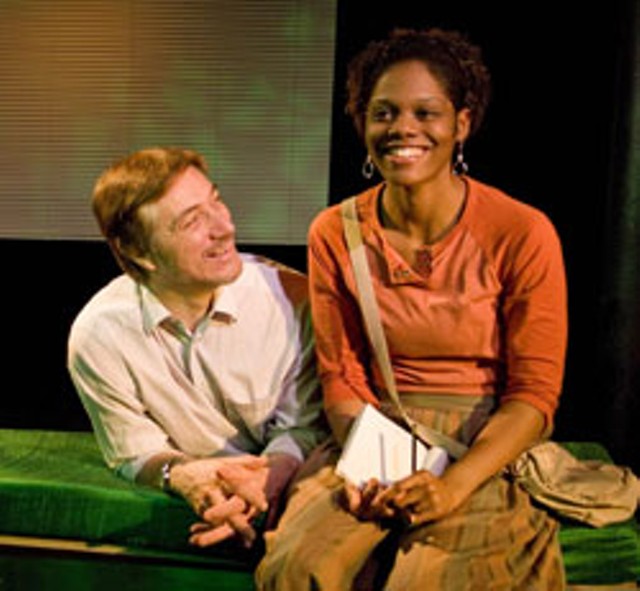Published February 4, 2009 at 6:47 a.m.
The horrors of genocide stagger the conscience. They become more difficult to comprehend, and easier to forget, when events occur in a distant, unfamiliar country such as Rwanda. Hutu or Tutsi — who killed whom, and when? How many people died? Most of us can’t answer these questions without relying on Google.
Anne Frank’s diary personalizes the Holocaust’s overwhelming death toll. We feel the loss of one girl deeply; 6 million seems an almost abstract number. In a similar way, playwright Sonja Linden uses one refugee’s tale to convey the savagery of what happened in 1994, when a million Tutsis and moderate Hutus were massacred and millions more were displaced. In the current Vermont Stage production of I Have Before Me a Remarkable Document Given to Me by a Young Lady from Rwanda (2002), Afton C. Williamson gives a riveting performance as Juliette, the sole survivor — or so she believes — of her murdered Tutsi family.
Linden based the script on her own experience in London helping torture survivors use writing as a therapeutic tool. One Rwandan woman’s struggle to create a book about losing her family inspired Linden’s two-person play. On stage, the writing teacher is a middle-aged poet and frustrated novelist named Simon. Juliette is his first student at the refugee center. She eagerly seeks assistance with a manuscript she has written about her country’s recent ordeal.
The relationship gets off to a rocky start. Juliette expects a proper British scholar who can find her a publisher, not a rumpled man with “a stain on his trousers!” Simon flounders as he tries to figure out how to mentor the troubled but earnest young woman. Her book is too dry and factual, despite the shocking history it recounts. Juliette initially recoils at his insistence that she start anew and pen a frank, first-person survivor’s account. Telling her story also means reliving the pain.
Simon finds himself gradually drawn into Juliette’s life, impressed by her resilience and worried about her circumstances. In her early twenties, Juliette is utterly alone in the world, penniless and living in a dingy hostel. Ten members of her family were butchered before her eyes. And yet she has a spark within her that kindles Simon’s dulled emotions and reignites his passion for writing poetry. And, as Juliette gradually learns to trust him, her path to healing begins to open, with a happy surprise along the way.
Every note of Williamson’s portrayal of Juliette is pitch-perfect: vocal, physical and emotional. She speaks with a gentle, musical lilt, while emphatically enunciating Juliette’s newly learned English. Williamson’s face rises and falls with Juliette’s cresting and ebbing emotions, and her eyes light up or grow dull as she remembers happy and horrific times.
The play’s most poignant scene takes place in Juliette’s room on the anniversary of the day the genocide began. Juliette spends it alone, lighting 10 candles — each one different — for the family members who were murdered. Williamson looks up and off into the distance, eyes shining as Juliette “sees” herself playing with her baby sister in the garden, joking with her father and teasing her brother. She recounts a memory as she lights each votive on a nearly darkened stage, until all 10 flicker in silence. The silence is broken only by the muffled sobs of audience members.
Larry Gleason, as Simon, crafts an authentic performance on an emotional level; he captures the feel of a fortysomething man in a funk who finds himself electrified by a new relationship. Gleason feeds off Williamson’s vibrancy, and together they establish the complex, moving connection between Simon and Juliette.
But Gleason’s accent, speech and mannerisms seem slightly forced, as if theatrically scaled up for a bigger hall than the FlynnSpace. The disparity in performances is mildly distracting. Williamson becomes Juliette on stage, while Gleason remains an actor — albeit a capable one — playing a role.
Director Christopher V. Edwards extracts just the right blend of sorrow and hope from the potent script. The wide layout of Jenny C. Fulton’s scenic design creates a generous sense of space in the tight venue. Edwards moves the actors effectively among the three playing areas, which are distinct but flow together. They represent Simon’s spartan office at the refugee center, Juliette’s depressing hostel room and the cluttered shed where Simon writes at home.
John B. Forbes’ lighting, seamless as always, conjures other locations, such as a London park. It also serves as a key element in the elegant scene transitions. Backlighting “freezes” the characters in shadow for a few seconds. Music — usually African — comes up, and the lights fade, so the actors can reset for the next scene. This polished technique paces the production effectively, so the 90-minute single act never feels long.
And afterward, viewers will never again forget what happened in Rwanda. The image of those 10 flickering candles, the stories behind them and Williamson’s tenacious portrait of Juliette guarantee it.
Want to see for yourself?
I Have Before Me a Remarkable Document Given to Me by a Young Lady from Rwanda, directed by Christopher V. Edwards, produced by Vermont Stage Company. FlynnSpace, Burlington. February 4-8, Wednesday-Saturday at 7:30 p.m., Saturday & Sunday at 2 p.m. New: Sunday, February 8 at 6 p.m. $24-32.50.
More By This Author
Speaking of...
-

Executive Director Kurt Thoma Leaves Barre Opera House
Mar 5, 2024 -

Vermonter's Musical Bound for Broadway With Hillary Clinton as a Producer
Oct 25, 2023 -

Phantom Theater Finds New Winter Venue in Waitsfield
Oct 13, 2023 -

Double E 2023 Summer Concert Series Kicks Off With the Wailers
Mar 17, 2023 -

Off Center for the Dramatic Arts to Reopen in the New North End
Sep 23, 2022 - More »
Comments
Comments are closed.
From 2014-2020, Seven Days allowed readers to comment on all stories posted on our website. While we've appreciated the suggestions and insights, right now Seven Days is prioritizing our core mission — producing high-quality, responsible local journalism — over moderating online debates between readers.
To criticize, correct or praise our reporting, please send us a letter to the editor or send us a tip. We’ll check it out and report the results.
Online comments may return when we have better tech tools for managing them. Thanks for reading.














































